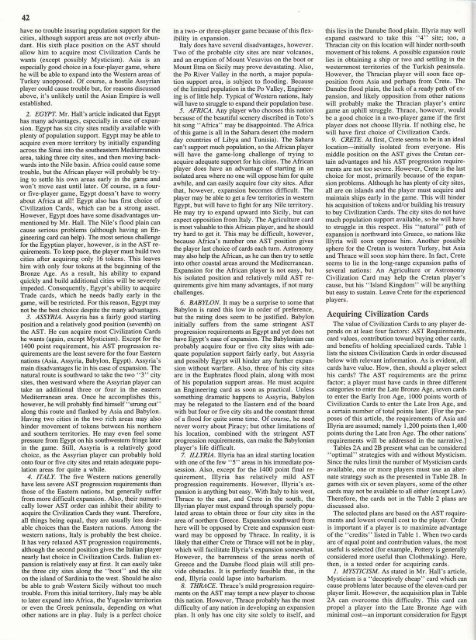general - View From The Trenches
general - View From The Trenches
general - View From The Trenches
- TAGS
- trenches
- www.vftt.co.uk
Create successful ePaper yourself
Turn your PDF publications into a flip-book with our unique Google optimized e-Paper software.
42<br />
have no trouble insuring population support for the<br />
cities, although support areas are not overly abundant.<br />
His sixth place position on the AST should<br />
allow him to acquire most Civilization Cards he<br />
wants (except possibly Mysticism). Asia is an<br />
especially good choice in a four-player game, where<br />
he will be able to expand into the Western areas of<br />
Turkey unopposed. Of course, a hostile Assyrian<br />
player could cause trouble but, for reasons discussed<br />
above, it's unlikely until the Asian Empire is well<br />
established.<br />
2. EGYPT Mr. Hall's article indicated that Egypt<br />
has many advantages, especially in ease of expansion.<br />
Egypt has six city sites readily available with<br />
plenty of population support. Egypt may be able to<br />
acquire even more territory by initially expanding<br />
across the Sinai into the southeastern Mediterranean<br />
area, taking three city sites, and then moving backwards<br />
into the Nile basin. Africa could cause some<br />
trouble, but the African player will probably be trying<br />
to settle his own areas early in the game and<br />
won't move east until later. Of course, in a fouror<br />
five-player game, Egypt doesn't have to worry<br />
about Africa at all! Egypt also has first choice of<br />
Civilization Cards, which can be a strong asset.<br />
However, Egypt does have some disadvantages unmentioned<br />
by Mr. Hall. <strong>The</strong> Nile's flood plain can<br />
cause serious problems (although having an Engineering<br />
card can help). <strong>The</strong> most serious challenge<br />
for the Egyptian player, however, is in the AST requirements.<br />
To keep pace, the player must build two<br />
cities after acquiring only 16 tokens. This leaves<br />
him with only four tokens at the beginning of the<br />
Bronze Age. As a result, his ability to expand<br />
quickly and build additional cities will be severely<br />
impeded. Consequently, Egypt's ability to acquire<br />
Trade cards, which he needs badly early in the<br />
game, will be restricted. For this reason, Egypt may<br />
not be the best choice despite the many advantages.<br />
3. ASSYRIA. Assyria has a fairly good starting<br />
position and a relatively good position (seventh) on<br />
the AST. He can acquire most Civilization Cards<br />
he wants (again, except Mysticism). Except for the<br />
1400 point requirement, his AST progression requirements<br />
are the least severe for the four Eastern<br />
nations (Asia, Assyria, Babylon, Egypt). Assyria's<br />
main disadvantages lie in his ease ofexpansion. <strong>The</strong><br />
natural route is southward to take the two "3" city<br />
sites, then westward where the Assyrian player can<br />
take an additional three or four in the eastern<br />
Mediterranean area. Once he accomplishes this,<br />
however, he will probably find himself "strung out"<br />
along this route and flanked by Asia and Babylon.<br />
Having two cities in the two ri::h areas may also<br />
hinder movement of tokens between his northern<br />
and southern territories. He may even feel some<br />
pressure from Egypt on his southwestern fringe later<br />
in the game. Still, Assyria is a relatively good<br />
choice, as the Assyrian player can probably hold<br />
onto four or five city sites and retain adequate population<br />
areas for quite a while.<br />
4. ITALY. <strong>The</strong> five Western nations <strong>general</strong>ly<br />
have less severe AST progression requirements than<br />
those of the Eastern nations, but <strong>general</strong>ly suffer<br />
from more difficult expansion. Also, their numerically<br />
lower AST order can inhibit their ability to<br />
acquire the Civilization Cards they want. <strong>The</strong>refore,<br />
all things being equal, they are usually less desirable<br />
choices than the Eastern nations. Among the<br />
western nations, Italy is probably the best choice.<br />
It has very relaxed AST progression requirements,<br />
although the second position gives the Italian player<br />
nearly last choice in Civilization Cards. Italian expansion<br />
is relatively easy at first. It can easily take<br />
the three city sites along the "boot" and the site<br />
on the island of Sardinia to the west. Should he also<br />
be able to grab Western Sicily without too much<br />
trouble. <strong>From</strong> this initial territory, Italy may be able<br />
to later expand into Africa, the Yugoslav territories<br />
or even the Greek peninsula, depending on what<br />
other nations are in play. Italy is a perfect choice<br />
in a two- or three-player game because ofthis flexibility<br />
in expansion.<br />
Italy does have several disadvantages, however.<br />
Two of the probable city sites are near volcanos,<br />
and an eruption of Mount Vesuvius on the boot or<br />
Mount Etna on Sicily may prove devastating. Also,<br />
the Po River Valley in the north, a major population<br />
support area, is subject to flooding. Because<br />
of the limited population in the Po Valley, Engineering<br />
is of little help. Typical ofWestern nations, Italy<br />
will have to struggle to expand their population base.<br />
5. AFRICA. Any player who chooses this nation<br />
because of the beautiful scenery discribed in Toto's<br />
hit song "Africa" may be disappointed. <strong>The</strong> Africa<br />
of this game is all in the Sahara desert (the modern<br />
day countries of Libya and Tunisia). <strong>The</strong> Sahara<br />
can't support much population, so the African player<br />
will have the game-long challenge of trying to<br />
acquire adequate support for his cities. <strong>The</strong> African<br />
player does have an advantage of starting in an<br />
isolated area where no one will oppose him for quite<br />
awhile, and can easily acquire four city sites. After<br />
that, however, expansion becomes difficult. <strong>The</strong><br />
player may be able to get a few territories in western<br />
Egypt, but will have to fight for any Nile territory.<br />
He may try to expand upward into Sicily, but can<br />
expect opposition from Italy. <strong>The</strong> Agriculture card<br />
is most valuable to this African player, and he should<br />
try hard to get it. This may be difficult, however,<br />
because Africa's number one AST position gives<br />
the player last choice ofcards each turn. Astronomy<br />
may also help the African, as he can then try to settle<br />
into other coastal areas around the Mediterranean.<br />
Expansion for the African player is not easy, but<br />
his isolated position and relatively mild AST requirements<br />
give him many advantages, if not many<br />
challenges.<br />
6. BABYLON. It may be a surprise to some that<br />
Babylon is rated this low in order of preference,<br />
but the rating does seem to be justified. Babylon<br />
initially suffers from the same stringent AST<br />
progression requirements as Egypt and yet does not<br />
have Egypt's ease of expansion. <strong>The</strong> Babylonian can<br />
probably acquire four or five city sites with adequate<br />
population support fairly early, but Assyria<br />
and possibly Egypt will hinder any further expansion<br />
without warfare. Also, three of his city sites<br />
are in the Euphrates flood plain, along with most<br />
of his population support areas. He must acquire<br />
an Engineering card as soon as practical. Unless<br />
something dramatic happens to Assyria, Babylon<br />
may be relegated to the Eastern end of the board<br />
with but four or five city sits and the constant threat<br />
of a flood for quite some time. Of course, he need<br />
never worry about Piracy; but other limitations of<br />
his location, combined with the stringent AST<br />
progression requirements, can make the Babylonian<br />
player's life difficult.<br />
7. IUYRIA. lllyria has an ideal starting location<br />
with one ofthe few "5" areas in his immediate possession.<br />
Also, except for the 1400 point final requirement,<br />
Illyria has relatively mild AST<br />
progression requirements. However, Illyria's expansion<br />
is anything but easy. With Italy to his west,<br />
Thrace to the east, and Crete in the south, the<br />
myrian player must expand through sparsely populated<br />
areas to obtain three or four city sites in the<br />
area of northern Greece. Expansion southward from<br />
here will be opposed by Crete and expansion eastward<br />
may be opposed by Thrace. In reality, it is<br />
likely that either Crete or Thrace will not be in play,<br />
which will facilitate Illyria's expansion somewhat.<br />
However, the barrenness of the areas north of<br />
Greece and the Danube flood plain will still provide<br />
obstacles. It is perfectly feasible that, in the<br />
end, lllyria could lapse into barbarism.<br />
8. THRACE. Thrace's mild progression requirements<br />
on the AST may tempt a new player to choose<br />
this nation. However, Thrace probably has the most<br />
difficulty of any nation in developing an expansion<br />
plan. It only has one city site solely to itself, and<br />
this lies in the Danube flood plain. Illyria may well<br />
expand eastward to take this "4" site; too, a<br />
Thracian city on this location will hinder north-south<br />
movement of his tokens. A possible expansion route<br />
lies in obtaining a ship or two and settling in the<br />
westernmost territories of the Turkish peninsula.<br />
However, the Thracian player will soon face opposition<br />
from Asia and perhaps from Crete. <strong>The</strong><br />
Danube flood plain, the lack of a ready path of expansion,<br />
and likely opposition from other nations<br />
will probably make the Thracian player's entire<br />
game an uphill struggle. Thrace, however, would<br />
be a good choice in a two-player game if the first<br />
player does not choose Illyria. If nothing else, he<br />
will have first choice of Civilization Cards.<br />
9. CRETE. At first, Crete seems to be in an ideal<br />
location-initially isolated from everyone. His<br />
middle position on the AST gives the Cretan certain<br />
advantages and his AST progression requirements<br />
are not too severe. However, Crete is the last<br />
choice for most, primarily because of the expansion<br />
problems. Although he has plenty ofcity sites,<br />
all are on islands and the player must acquire and<br />
maintain ships early in the game. This will hinder<br />
his acquisition of tokens and/or building his treasury<br />
to buy Civilization Cards. <strong>The</strong> city sites do not have<br />
much population support available, so he will have<br />
to struggle in this respect. His "natural" path of<br />
expansion is northward into Greece, so nations like<br />
Illyria will soon oppose him. Another possible<br />
sphere for the Cretan is western Turkey, but Asia<br />
and Thrace will soon stop him there. In fact, Crete<br />
seems to lie in the long-range expansion paths of<br />
several nations: An Agriculture or Astronomy<br />
Civilization Card may help the Cretan player's<br />
cause, but his "Island Kingdom" will be anything<br />
but easy to sustain. Leave Crete for the experienced<br />
players.<br />
Acquiring Civilization Cards<br />
<strong>The</strong> value of Civilization Cards to any player depends<br />
on at least four factors: AST Requirements,<br />
card values, contribution toward buying other cards,<br />
and benefits of holding specialized cards. Table I<br />
lists the sixteen Civilization Cards in order discussed<br />
below with relevant information. As is evident, all<br />
cards have value. How, then, should a player select<br />
his cards? <strong>The</strong> AST requirements are the prime<br />
factor; a player must have cards in three different<br />
categories to enter the Late Bronze Age, seven cards<br />
to enter the Early Iron Age, 1000 points worth of<br />
Civilization Cards to enter the Late Iron Age, and<br />
a certain number of total points later. [For the purposes<br />
of this article, the requirements of Asia and<br />
lllyria are assumed; namely 1,200 points then 1,400<br />
points during the Late Iron Age. <strong>The</strong> other nations'<br />
requirements will be addressed in the narrative.]<br />
Tables 2A and 2B present what can be considered<br />
"optimal" strategies with and without Mysticism.<br />
Since the rules limit the number of Mysticism cards<br />
available, one or more players must use an alternate<br />
strategy such as the presented in Table 2B. In<br />
games with six or seven players, some of the other<br />
cards may not be available to all either (except Law).<br />
<strong>The</strong>refore, the cards not in the Table 2 plans are<br />
discussed also.<br />
<strong>The</strong> selected plans are based on the AST requirements<br />
and lowest overall cost to the player. Order<br />
is important if a player is to maximize advantage<br />
of the "credits" listed in Table I. When two cards<br />
are of equal point and contribution values, the most<br />
useful is selected (for example, Pottery is <strong>general</strong>ly<br />
considered more useful than Clothmaking). Here,<br />
then, is a tested order for acquiring cards.<br />
I. MYSTICISM. As stated in Mr. Hall's article,<br />
Mysticism is a "deceptively cheap" card which can<br />
cause problems later because of the eleven-card per<br />
player limit. However, the acquisition plan in Table<br />
2A can overcome this difficulty. This card can<br />
propel a player into the Late Bronze Age with<br />
minimal cost-an important consideration for Egypt
















